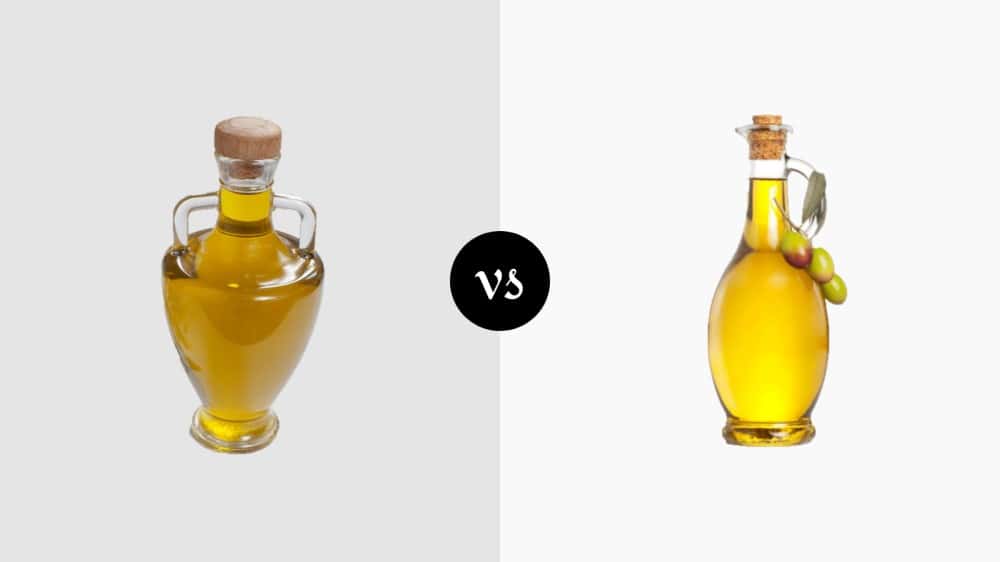
Olive oil has always been considered the healthier alternative to all other cooking oils. Italian and Greek are two types of olive oil available in the market. But to a layman, they look quite the same, so what is the difference between the two?
Well, both of them are known for producing some of the best olive oils in the world. However, from the soil in which their olive trees grow to the process of extracting the oils, everything is done very differently in these two countries.
Greek vs Italian Olive Oil
Comparison Table
| Features | Greek | Italian |
|---|---|---|
| Country of origin | Greece | Italy |
| Color | Brownish | Green |
| Flavor | Bitter and spicy | Mild and fruity |
| Strength | High | Low |
Greek Olive Oil
Greek olive oil is more on the grassy side. Rather than bringing a strong taste, it serves as an excellent complimentary ingredient. Depending on where it is cultivated, it can have hints of a peppery taste. Greek olive oils are mainly made from the Kalamata olives.
Flavor
This kind of olive oil has an exquisite taste, and its acidity is less than one percent, which is the reason why it has a much milder flavor when compared to Italian olive oil. You would be glad to know that Greek olive oil has near to 0% cholesterol and has anti-aging components
Greek olive oil is also high in vitamin E and phytosterols. If you want to determine the quality of Greek olive oil, you can evaluate it by its fruitiness and aroma. These two indicate how fresh the olives were when they were pressed for oils.
As mentioned above, olive oil should have a fruitiness to it since they are, after all, made from fruits. By fruitiness, we mean it must have a little aroma and flavor of fruits such as artichokes or green apples. It should taste fresh, not too heavy or oily.

You should not feel as if you have been weighed down after tasting olive oil. This may come as a surprise to you, but Greek olive oil should also taste bitter, just like how fresh fruits taste bitter when you eat them right off the tree. The bitterness shows the freshness of the fruit.
Lastly, the olive oil should also taste pungent or peppery. This peppery sensation usually comes right when you are about to swallow the oil. However, the pungency should fade away; that is to say, it should not linger.
Uses
Greek olive oil can be used for frying, sauteing, and roasting. There are several types of this oil available, including extra virgin olive oil, virgin olive oil, olive-pomace oil, and refined olive oil.
Italian Olive Oil
Italian olive oil has a very distinct smell and robust flavor that is difficult to miss. In fact, if you put it in a glass, you will be able to recognize the Italian olive oil just from the smell. It is described as having the scent of a “summer meadow”.
Flavor
This is how the flavor of Italian olive oil is described generically. However, the taste can vary depending on where in Italy the oil is produced. If we were to describe the flavor of Italian olive oil, we would describe it as somewhat bitter with hints of spice.
The smell of this olive oil is a lovely mix of green leaves, fresh-cut grass, artichokes, almonds, and ripe fruits. The color of Italian olive oil is most commonly found to be a vibrant green. Sometimes, it may also be a yellowish-golden color.
Italian olive oil has a higher percentage of phytosterol cycloartenol when compared to olive oils from other countries. This compound is plant-based, and it helps in lowering cholesterol and maintains a healthy cardiovascular system in the body.
Uses

Italian olive oil can be used for frying, or as a dressing for various dishes. The different kinds of olives usually used in the making of Italian olive oil are leccino, moraiolo, coratina, frantoio, and nocellara.
Final Verdict
We have listed all the differences between Italian and Greek cooking oils. Which one you want to use depends on the kind of flavor you want. Italian oil is a preferred option for many, thanks to its stronger flavor.
If you wish for your olive oil to be the driver of the dish, then Italian olive oil, with its intense flavor and character, should be your pick. On the other hand, if you would rather have a subtle and subdued taste, then Greek olive oil will be a better option.
